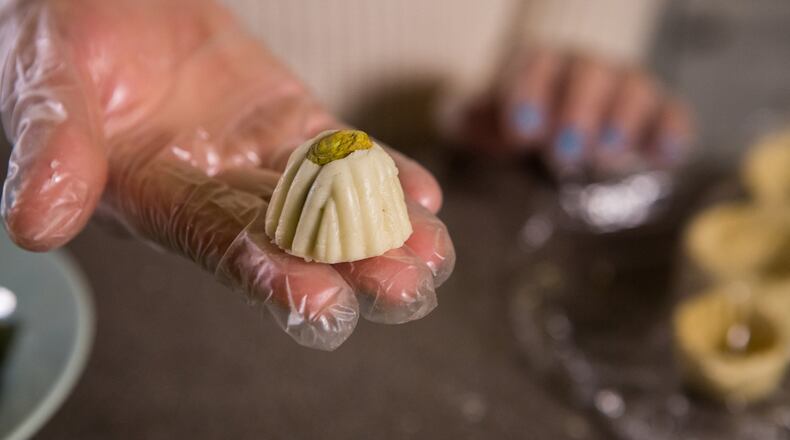The young Syrian woman’s fingers (even wrapped in plastic gloves) move like those of a concert violinist as she produces a symphony of sweet tastes.
She pinches, rolls, squashes and stretches a ball of sweet, orange blossom-scented dough, forming it into a pocket, ready for filling.
Into the recess goes a marble-sized nugget of ground pistachios, or smooth dates, or coconut, before she reseals the dough and presses the cookie in one of her special molds, giving it sharp, smooth edges and gentle flutings.
Out pops the well-shaped sweet onto a pan, ready for the oven, and Ruwaida, adjusting her lacy hijab, moves on to the next ball of dough. In a nearby commercial kitchen she’s already made 30 dozen, and it’s not even lunchtime. This particular batch she’s making at home, for her friend Amanda Avutu, and for a reporter and a photographer, and for a translator who speaks Arabic.
And because cookies are better with a hot beverage, Ruwaida measures finely-ground coffee into a cezve — a small, metallic Turkish pot — and boils it cowboy-style on the stove in her galley kitchen, stirring gently. After several minutes, she pours the unfiltered brew into delicate Turkish demitasse cups. The aromatic super-strong brew, blooming with the scent of cardamom, pairs nicely with the sweet, delicate chew of a sesame-coated, date-filled cookie.
Ruwaida, 29, has come a long way to bring this tasty experience to Atlanta appetites. Five years ago, she and her husband Khaled, 35, and their two children, Zainab, 12 and Mohammad, 9, walked away from Syria, leaving behind their home and their small electronics business, bringing only what they could carry.
On foot, they crossed the mountains into Jordan, and after four years were sponsored to travel to the U.S. by Atlanta-based New American Pathways and Holy Trinity Parish Episcopal Church in Decatur.
Among the volunteers who helped them outfit a modest two-room carriage house apartment in their new Decatur neighborhood last year was Avutu, who wrote about the experience for The New York Times.
Her heart went out to them, she wrote. “These were people searching for safety, much as my Hungarian ancestors had tried to do in the 1930s before they were taken to concentration camps.”
Avutu's words demonstrate the seriousness of the situation for Syrian refugees. Things seemed to grow more worrisome with the 2016 campaign resurfacing a fervent—and often divisive—conversation around immigrants. In the meantime, the prospect of escaping to the U.S. became imminent.
Ruwaida still lives in a dangerous world. Avutu said Ruwaida has asked that photos not show her face and that stories not use their last name, in order to protect family still in Syria. Avutu was also concerned about anti-Muslim sentiment in Atlanta. “I’ve seen it,” she said.
The family began seeking employment, though with their minimal command of English, their options were limited. “The job prospects are kind of bleak around here,” said Avutu. “You can work in chicken processing, or maybe rug repair.”
But each time Auvutu came to visit the family, Ruwaida served her own delicious cookies. Avutu realized an opportunity was staring her in the face. The idea for Sweet Sweet Syria, a cookie business, was born.
To test the market, Ruwaida set up a booth at Porchfest, the do-it-yourself music marathon that fills the streets of the Oakhurst neighborhood each fall. She sold 45 dozen cookies before the bands had even started playing.
But she would need help creating a business. Her supporters, led by Decatur resident Marnie Grodzin, launched a GoFundMe account that would pay for space in a commercial kitchen, supplies, licensing and perhaps a delivery van.
Donors surpassed the original goal of $15,000, so Grodzin doubled it to give the family the opportunity to pay for such things as insurance, and to fund the stretch goal of opening a full-blown restaurant at some point in the future. The site remains open.
The warm welcome given to the family was in some ways an attempt to counter the hostility from political leaders, said Grodzin. She heard from GoFundMe donors who said, “I’ve felt so helpless watching the news. I wanted to do something.”
Ruwaida’s ambitions go far beyond cookies. She has demonstrated her culinary abilities at private supper clubs that the family hosts every now and then, where tables groan with platters of hummus, baba ghanoush, kibbeh and shish kebabs.
But the cookies have a special place in her heart. She learned the recipes from her mother, who in turn learned them from her mother, she said, through translator Rahwa Kiflemariam, an Arabic-speaking native of Eritrea, who now lives in nearby Clarkston.
Like Christmas cookies in the U.S., these sweets play a special role in Syria. During the Muslim holiday Eid there was always a tray of cookies out for visitors, says Ruwaida.
And one of the few keepsakes that survived the trip from Damascus was a wooden cookie mold, that was handed down mother to child.
“I have this to remind me of my mother,” she said, “and her mother as well.”
About the Author
Keep Reading
The Latest
Featured






